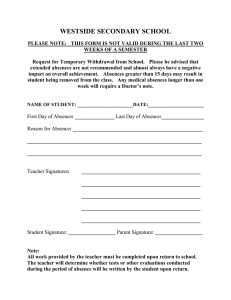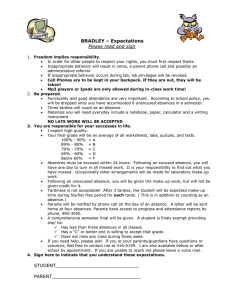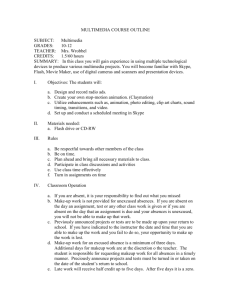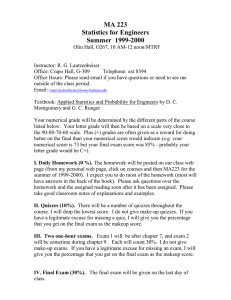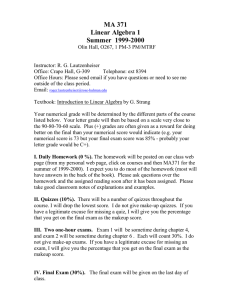232 A student’s first responsibility is to attend class and learn.... POLICY ON STUDENT ABSENCES
advertisement
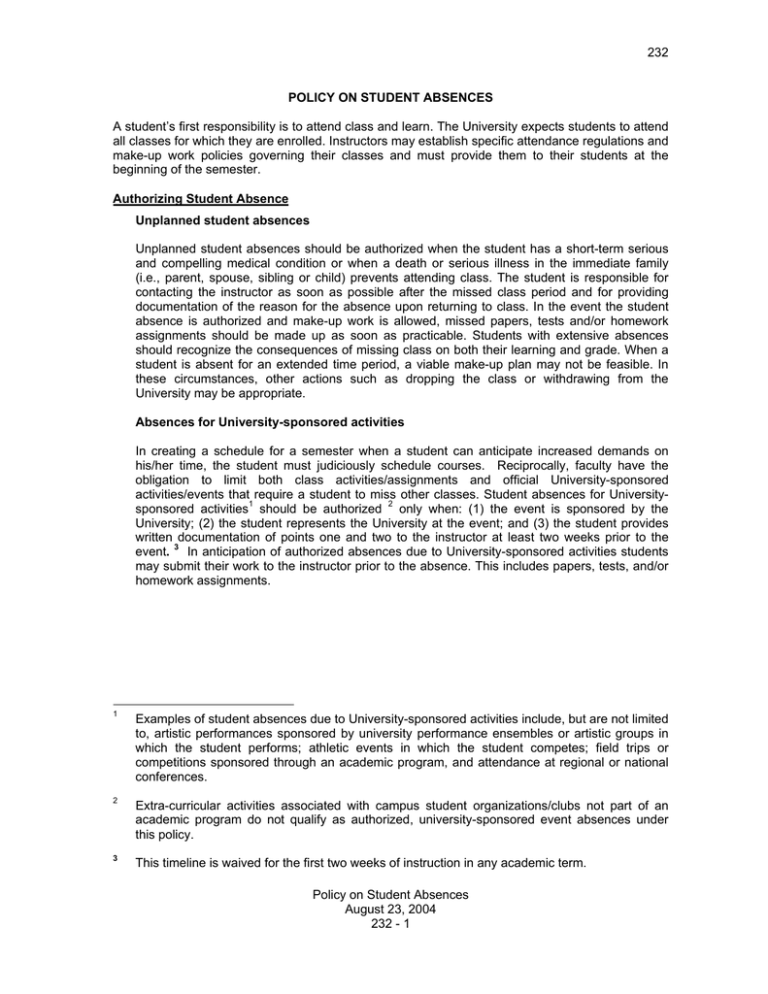
232 POLICY ON STUDENT ABSENCES A student’s first responsibility is to attend class and learn. The University expects students to attend all classes for which they are enrolled. Instructors may establish specific attendance regulations and make-up work policies governing their classes and must provide them to their students at the beginning of the semester. Authorizing Student Absence Unplanned student absences Unplanned student absences should be authorized when the student has a short-term serious and compelling medical condition or when a death or serious illness in the immediate family (i.e., parent, spouse, sibling or child) prevents attending class. The student is responsible for contacting the instructor as soon as possible after the missed class period and for providing documentation of the reason for the absence upon returning to class. In the event the student absence is authorized and make-up work is allowed, missed papers, tests and/or homework assignments should be made up as soon as practicable. Students with extensive absences should recognize the consequences of missing class on both their learning and grade. When a student is absent for an extended time period, a viable make-up plan may not be feasible. In these circumstances, other actions such as dropping the class or withdrawing from the University may be appropriate. Absences for University-sponsored activities In creating a schedule for a semester when a student can anticipate increased demands on his/her time, the student must judiciously schedule courses. Reciprocally, faculty have the obligation to limit both class activities/assignments and official University-sponsored activities/events that require a student to miss other classes. Student absences for Universitysponsored activities1 should be authorized 2 only when: (1) the event is sponsored by the University; (2) the student represents the University at the event; and (3) the student provides written documentation of points one and two to the instructor at least two weeks prior to the event. 3 In anticipation of authorized absences due to University-sponsored activities students may submit their work to the instructor prior to the absence. This includes papers, tests, and/or homework assignments. 1 Examples of student absences due to University-sponsored activities include, but are not limited to, artistic performances sponsored by university performance ensembles or artistic groups in which the student performs; athletic events in which the student competes; field trips or competitions sponsored through an academic program, and attendance at regional or national conferences. 2 Extra-curricular activities associated with campus student organizations/clubs not part of an academic program do not qualify as authorized, university-sponsored event absences under this policy. 3 This timeline is waived for the first two weeks of instruction in any academic term. Policy on Student Absences August 23, 2004 232 - 1 232 Make-Up Work Policy Faculty policies on attendance and make-up work must be clearly stated on the course syllabus and consistently applied (See APM 241). Faculty should make reasonable accommodation for authorized student absences. Faculty are expected to allow make-up work for authorized student absences, provided there is not an unreasonable number of authorized absences during the semester and provided make-up work can be accomplished without substantial additional cost in time or resources to the academic department or the instructor. It must be recognized that not all learning activities and exercises during class times and laboratory periods can be replicated in such cases, students are at risk when they are absent. When a student is absent on a repeated basis and/or for an extended time period, a viable make-up plan may not be feasible. In these circumstances, other options such as dropping the class for a serious and compelling reason or withdrawal from the University may be appropriate. ______________________________________________________ Recommended by Academic Senate, May 2004 Approved by the President August 23, 2004 Policy on Student Absences August 23, 2004 232 - 2
